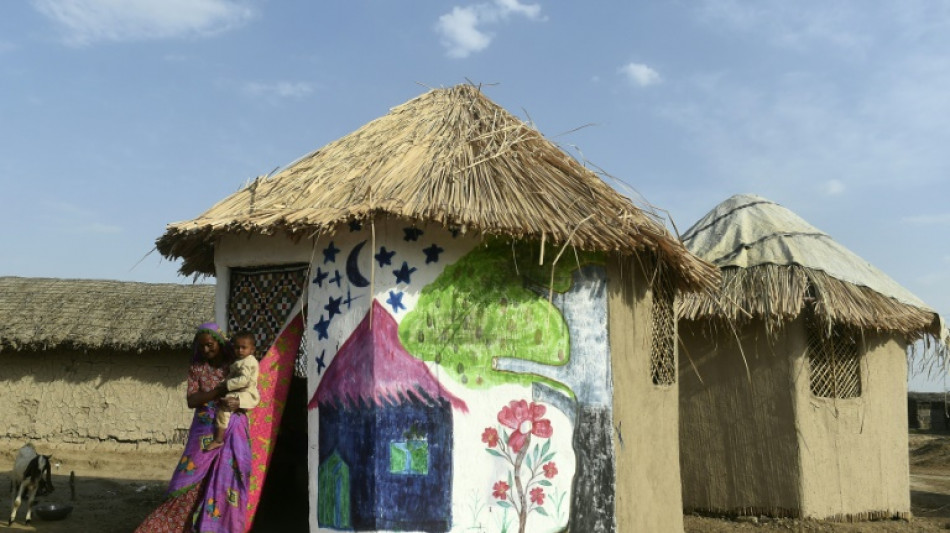
-
 'An inauspicious day': the landmines ruining Myanmar lives
'An inauspicious day': the landmines ruining Myanmar lives
-
UN to vote again on Gaza ceasefire, US plans unclear

-
 Japan's manga powerhouse 'Dragon Ball' turns 40
Japan's manga powerhouse 'Dragon Ball' turns 40
-
Japanese, Koreans bottom of global love life survey

-
 Son blames 'mistakes' after South Korea held by Palestine in qualifier
Son blames 'mistakes' after South Korea held by Palestine in qualifier
-
Japan ramps up tech ambitions with $65 bn for AI, chips

-
 Lights, action, melodrama! Silent films get new reel at London haven
Lights, action, melodrama! Silent films get new reel at London haven
-
Myanmar led world in landmine victims in 2023: monitor

-
 ICC to sentence Timbuktu war criminal
ICC to sentence Timbuktu war criminal
-
Ugandan opposition figure Besigye 'kidnapped', says wife

-
 Australia's Jason Day eyes more major glory after resurgence
Australia's Jason Day eyes more major glory after resurgence
-
Machu Picchu security boosted after visitors spread human ashes

-
 Popovic hails Australia character in 'crazy' World Cup qualifier
Popovic hails Australia character in 'crazy' World Cup qualifier
-
Taliban govt clearing 'un-Islamic' books from Afghanistan shelves

-
 Argentina beat Peru as Uruguay hold Brazil
Argentina beat Peru as Uruguay hold Brazil
-
Asian markets struggle as traders weigh geopolitical tensions

-
 Tatum stars as Celtics end Cavaliers unbeaten start
Tatum stars as Celtics end Cavaliers unbeaten start
-
Hurting India under pressure in blockbuster five-Test Australia series

-
 'They killed her dream': Israel strike leaves woman footballer in coma
'They killed her dream': Israel strike leaves woman footballer in coma
-
Iraq holds its first census in nearly 40 years

-
 Iraqis face tough homecoming a decade after IS rampage
Iraqis face tough homecoming a decade after IS rampage
-
Russian net tightens around last civilians left in eastern Ukraine

-
 Olympic champion Tebogo aims to inspire next generation of African athletes
Olympic champion Tebogo aims to inspire next generation of African athletes
-
Valencia on target as ten-man Ecuador upset Colombia

-
 'Rust' to premiere three years after on-set shooting
'Rust' to premiere three years after on-set shooting
-
Strike at French cognac maker Hennessy over measures in China spat

-
 Xi, Lula meet in Brasilia to 'enhance ties'
Xi, Lula meet in Brasilia to 'enhance ties'
-
SpaceX fails to repeat Starship booster catch, as Trump watches on

-
 'I have left a legacy': Nadal retires from tennis
'I have left a legacy': Nadal retires from tennis
-
US recognizes Venezuela opposition's Gonzalez Urrutia as 'president-elect'

-
 European powers, US seek to censure Iran at UN nuclear watchdog board
European powers, US seek to censure Iran at UN nuclear watchdog board
-
UNAIDS chief says husband, Ugandan opposition figure Besigye, 'kidnapped'

-
 Nadal's sensational career ends as Netherlands defeat Spain in Davis Cup
Nadal's sensational career ends as Netherlands defeat Spain in Davis Cup
-
US announces talks with Israel over civilian casualties in Gaza

-
 SpaceX fails to repeat Starship booster catch, as Trump looks on
SpaceX fails to repeat Starship booster catch, as Trump looks on
-
G20 summit ends with Ukraine blame game

-
 Trump appoints TV celebrity 'Dr. Oz' to key US health post
Trump appoints TV celebrity 'Dr. Oz' to key US health post
-
European stocks fall on Ukraine-Russia fears, US focused on earnings

-
 Last-gasp Szoboszlai penalty rescues Hungary draw with Germany
Last-gasp Szoboszlai penalty rescues Hungary draw with Germany
-
Germany, Netherlands draw as Nations League group stage ends

-
 Hong Kong tycoon Jimmy Lai takes witness stand in collusion trial
Hong Kong tycoon Jimmy Lai takes witness stand in collusion trial
-
Guardiola set to extend stay as Man City boss - reports

-
 Minnows Botswana hold Egypt to qualify with Mozambique, Tanzania
Minnows Botswana hold Egypt to qualify with Mozambique, Tanzania
-
Inter Miami coach Martino leaving club for 'personal reasons' - club source

-
 Chinese man sentenced to 20 months for Falun Gong harassment in US
Chinese man sentenced to 20 months for Falun Gong harassment in US
-
Hong Kong court jails 45 democracy campaigners, drawing condemnation

-
 'I did it for Rafa': Alcaraz after keeping Spain Davis Cup dream alive
'I did it for Rafa': Alcaraz after keeping Spain Davis Cup dream alive
-
Alcaraz keeps Spain and Nadal Davis Cup dream alive

-
 Trump names China hawk Howard Lutnick commerce secretary
Trump names China hawk Howard Lutnick commerce secretary
-
Europe's pivotal role in bid to strike COP29 climate deal


The octogenarian architect working to flood-proof Pakistan
At 82 years old, architect Yasmeen Lari is forging the way in fortifying Pakistan's rural communities living on the frontline of climate change.
Lari, Pakistan's first woman architect, has ditched a lifetime of multi-million dollar projects in the megacity of Karachi to develop pioneering flood-proof bamboo houses.
The few pilot settlements already constructed are credited with saving families from the worst of the catastrophic monsoon flooding that put a third of the country underwater last year.
"We continued to live in them," said Khomo Kohli, a 45-year-old resident of Pono Colony village, which is a few hundred kilometres outside of Karachi.
"The rest of the residents had to move onto the road where they lived for two months until the water receded."
Now, Lari is campaigning to scale up the project to one million houses made from affordable local materials, bringing new jobs to the most vulnerable areas.
"I call it a kind of co-building and co-creation, because the people have an equal part in embellishing it and making it comfortable for themselves," she said.
The architect, who trained in the United Kingdom, is behind some of Karachi's most notable buildings, including brutalist constructions such as the Pakistan State Oil headquarters, as well as a string of luxury homes.
As she was considering retirement, a series of natural disasters -- including a massive 2005 earthquake and 2010 floods -- stiffened her resolve to continue working with her Heritage Foundation of Pakistan, which manages her rural projects.
"I had to find the solution, or find a way by which I could build up the capacities of people so that they could fend for themselves, rather than waiting for outside help," she told AFP.
"My motto is zero carbon, zero waste, zero donor, which I think leads to zero poverty," she said.
- Traditional techniques -
Climate change is making monsoon rains heavier and more unpredictable, scientists say, raising the urgency to flood-proof the country -- particularly as the poorest live in the most vulnerable areas.
Pakistan, with the world's fifth-largest population, is responsible for less than one percent of global greenhouse gas emissions but is one of the nations most vulnerable to the effects of extreme weather.
Pono Colony, with around 100 houses, was developed just months before catastrophic monsoon rains arrived last summer and displaced eight million people.
The village's elevated homes are protected from rushing water, while their bamboo skeletons -- pierced deep into the ground -- can withstand pressure without being uprooted.
Known locally as "chanwara", the mud huts are an improved take on the traditional single-room houses dotted along the landscape of southern Sindh province and Rajasthan state in India.
They require only locally available materials: lime, clay, bamboo and thatching. With straightforward training to locals, they can be assembled at a cost of around $170 -- around an eighth of the cost of a cement and brick house.
In rural Sindh, tens of thousands of people are still displaced and stagnant water stands in large parts of farmland almost a year after the country's worst-ever floods.
The World Bank and Asian Development Bank in a joint study estimated Pakistan sustained $32 billion in damage and economic losses and would require $16 billion for reconstruction and rehabilitation.
- Royal recognition -
Lari recalls working on social housing in Lahore in the 1970s, when local women pored over her plans and probed her on where their chickens would live.
"Those chickens have really remained with me, the women's needs are really the uppermost when I'm designing," she said.
This time around, the redesign of traditional stoves has become a significant feature -- now lifted off the floor.
"Earlier, the stove would have been on the ground level and so it was immensely unhygienic. The small children would burn themselves on the flames, stray dogs would lick pots and germs would spread," said Champa Kanji, who has been trained by Lari's team to build stoves for homes across Sindh.
"Seeing women becoming independent and empowered gives me immense pleasure," Lari said.
Lari's work has been recognised by the Royal Institute of British Architects, which awarded her the 2023 Royal Gold Medal for her dedication to using architecture to change people's lives.
"An inspirational figure, she moved from a large practice centred on the needs of international clients to focussing solely on humanitarian causes," RIBA president Simon Allford said.
"This is wonderful feeling," Lari said. "But of course it also makes my tasks harder. I have got to make sure that I now deliver."
M.O.Allen--AT

